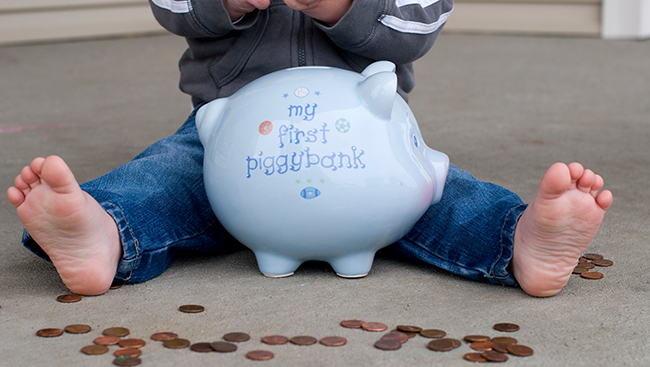It’s important for parents to take charge and teach their children about money management.
Money can often be a taboo subject to discuss, but it’s important for parents to take charge and teach their children about personal finance and money management. When it comes to teaching your child about money, where do you start? According to the Financial Consumer Agency of Canada (FCAC), it is best “to start teaching children about money when they’re young. If you start early, you can build on their knowledge as they grow.”
“Children are sponges, soaking up every verbal and non-verbal interaction,” says Asa Don Brown, author, professor and clinician. They have an enormous capacity to learn and absorb information, so parents can start to instill teachings about how to manage money at an early age, in addition to teaching them about the value of money.
According to Jeff Maskell, credit counsellor with the Credit Counselling Society, “parents often underestimate what their kids can handle being taught and at what age. Kids under 10 can easily grasp the ideas of budgeting or interest if you teach them simply, and the sooner they grasp the concept of “limited means, unlimited wants” the better.”
Maskell explains the concept of “limited means, unlimited wants” – from childhood to adulthood, individuals want an abundance of things, however it’s important to realize that we nearly always have a limited amount of income or savings. For most of us, most of the time, what we “want” exceeds our ability to pay (“means”).
Parents need to discuss and help their kid understand the difference between needs versus wants. For example, parents can explain that money should be spent on things they need – housing, food and clothing, before the things they want – candy, toys and sporting gear.
Furthermore, make learning about money part of everyday life. For example, explain the concept of a budget and/or spending plan and why it’s important. “One way to engage kids in budgeting and finances is to make it fun. Turn budgeting for back-to-school or Christmas shopping into a game,” says Jennifer Schofield, credit counsellor with the Credit Counselling Society.
She adds, “Budgeting for anything can be turned into a game, explain that we have ‘x’ amount of dollars and this is the list of needed supplies.
The goal of the game/lesson for kids is to figure out the spending plan, and how that can be accomplished (with assistance from the parents depending on their age).”
How do you explain the concept of budget to a child?
According to MyMoneyCoach.ca, a personal finance educational website, “a budget is the process of creating a plan to spend your money. Creating this spending plan allows you to determine in advance whether you will have enough money to do the things you need to do or would like to do.”
It’s important for parents to talk to their children of all ages about the following five money principles from MyMoneyCoach.ca, which will not only guide them now, but well into their future as adults:
1. Money doesn’t grow on trees
Explain this concept to your children so that they have a sense of reality when it comes to money in terms of needs versus wants. “If left unchecked, your kids could grow up with an entitlement attitude and not be able to make the connection between living within their means and making wise spending decisions.”
2. Let kids learn from their own mistakes
Explain the pros and cons of a decision and let your kids make the decision, even if it’s wrong. This will teach them a “valuable lesson when they realize there are real consequences for the decisions they make.”
3. The importance of delayed gratification
Help your kids set a financial goal and save towards that goal (e.g. buying a bike or an iPad). This will not only teach them the importance of saving money,
but they will learn that hard work pays off and it is feasible to achieve a set goal.
4. Credit is not the same as money
Explain to your child how credit works, the importance of a good credit rating, and when not to use credit to make impulse purchases. This is an important concept for teenagers to learn and understand.
5. Keeping up with the Joneses won’t make you happy
In this digital era, kids are constantly inundated with the latest products and services plus peer pressure doesn’t help. “This is challenging for parents to overcome, reinforce what really matters; having friends and family that care about your kids for their values and who they are versus what stuff they have.”





